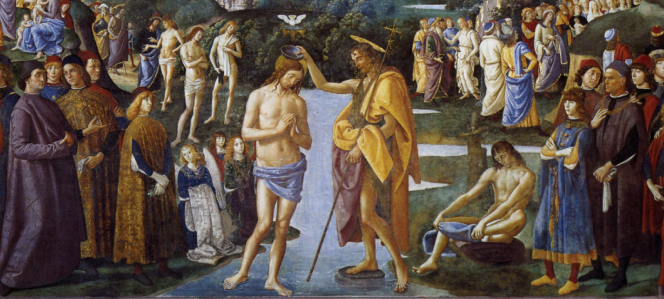Today the Church celebrates the solemnity of the Baptism of the Lord, and it is with this awe-filled liturgy that the three great revelations or “theophanies” of the Christmas season are brought to stunning fulfillment.
The first of these revelations was the birth of the Christ child which was celebrated on Christmas Day. This “theophany” presented to us the first occasion when it was made known to human sight that God had accepted for himself a human nature and allowed himself to be born in this world as a man. God comes to Israel and the world in much the same manner as we all have. God is born in Christ to particular parents, into a particular family, and at a particular place and time. God is who Christ is- as an infant, as a child, and as a grown man: Christ is God!
The second of these revelations was commemorated in the United States last week in the solemnity of Christ’s Epiphany. In this liturgy, the theophany of Christ as Messiah (that is, as the true king of Israel) was revealed. With this revelation came also signs that foreshadowed Christ’s mission- a mission by which he would transform both Israel and the world. The Church professes and believes that Christ is the fulfillment of the expectations of Israel that God would send to his people a Messiah; but more than this, we believe that it is the God of Israel himself who comes into this world as the Messiah!
The third of these revelations is presented in the liturgy for today in which the Church accepts and discerns the event of Christ’s Baptism.
Though this event hearkens to and foreshadows the Church’s Sacrament of Baptism, we shouldn’t confuse the two. Christ does not receive the Sacrament of Baptism, and what John imparts is not what the Church is doing when people are baptized.
The baptism of John was a ritual act of purifications which was much like the mikvah that a faithful Israelite accepted before they entered the precincts of the Temple. John presented his mikvah or baptism as an act by which one would be prepared to receive the Messiah and enter with him into the Messianic Age.
It is mysterious as to why Christ would himself accept this kind of baptism.
Perhaps it is to show the depth of his identification with Israel and that, as their Messiah, he would not expect or ask anything of his chosen people that he would not at first undergo himself.
Or maybe it is to foreshadow his immersion into sin and death in the terrifying event of the cross. As he descends into the depths of the Jordan River and then emerges, so will it be in his Paschal Mystery.
The Fathers of the Church presented the insight that as Christ immersed himself in the waters of John’s baptism, he sanctified all the waters of the world for use in the Church’s Sacrament of Baptism.
These are all interesting and helpful insights, but none in itself is the revelation or the theophany that today’s liturgy presents.
The great revelation of the Lord’s Baptism is discerned, not in the reason that he accepts Baptism, but that in that moment something about God’s identity was revealed that was not fully known or even believed to be possible. The Baptism of Christ is the occasion when the Trinity is revealed- the Son makes himself known, the Father speaks, and the Holy Spirit descends. It is this mystery, the mystery of the Trinity, that brings the revelations or the theophanies of the holy season of Christmas to their fulfillment.
The lesson?
Remember Christians, you do not believe that God is merely an idea in your mind or a projection of your best self. God is not for you some unknown and unknowable force in the universe or a feeling that you contain in your heart. The one, true God has revealed himself in Christ as the Trinity- the mysterious communion of Father, Son and Holy Spirit, a communion of Divine Love “in which we live and move and have our being.” It is this Divine Love that brought all into existence, and because of Christ, it is to this Divine Love that we will all one day return.
